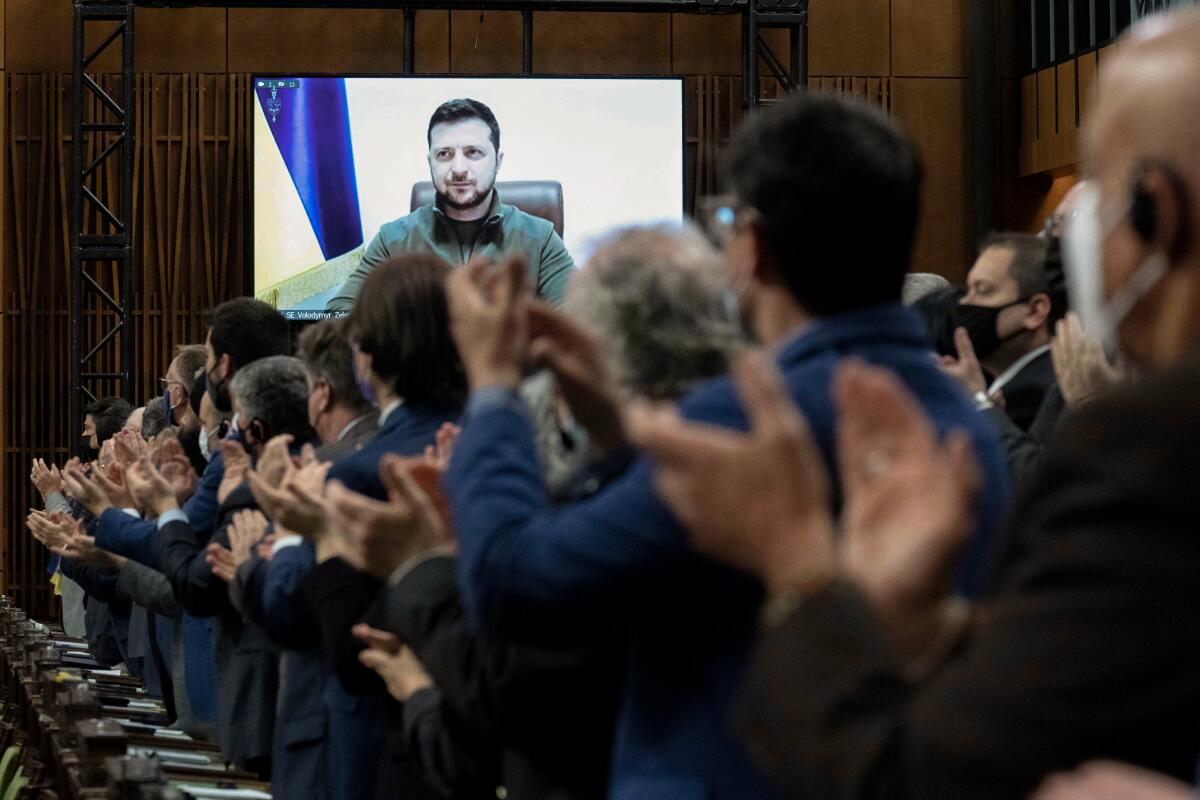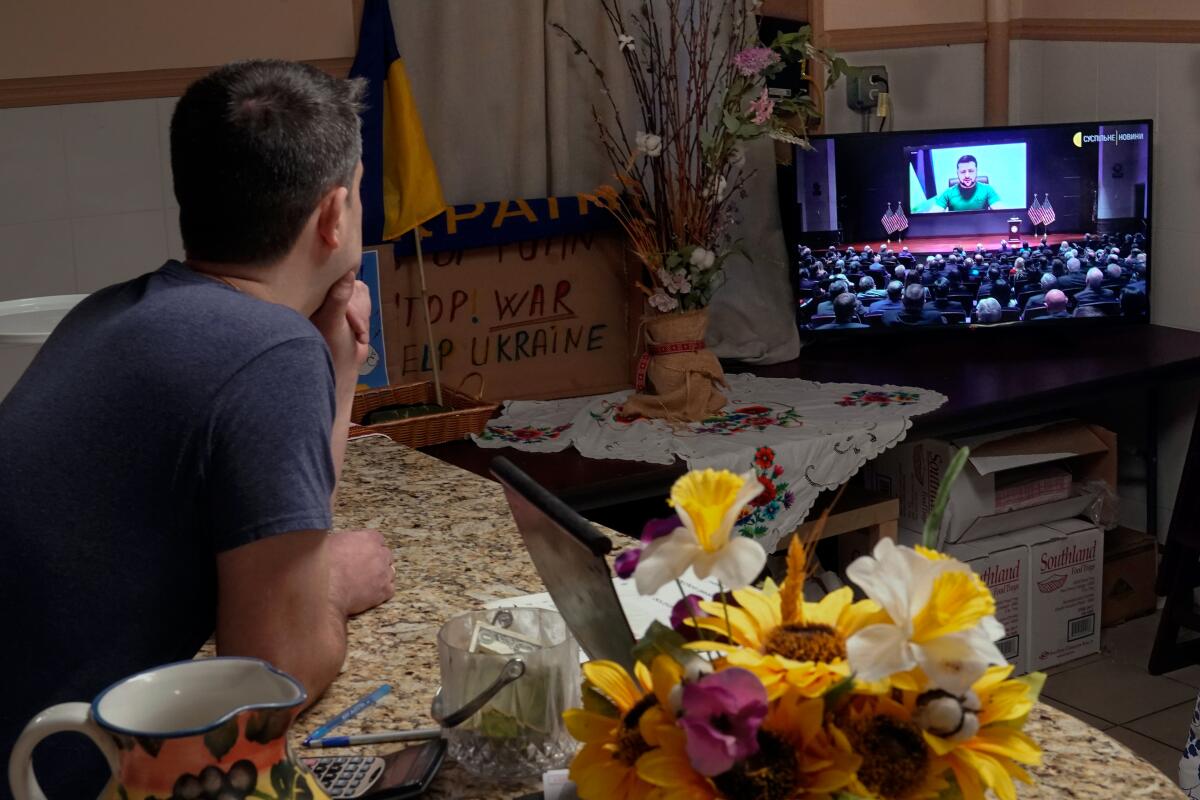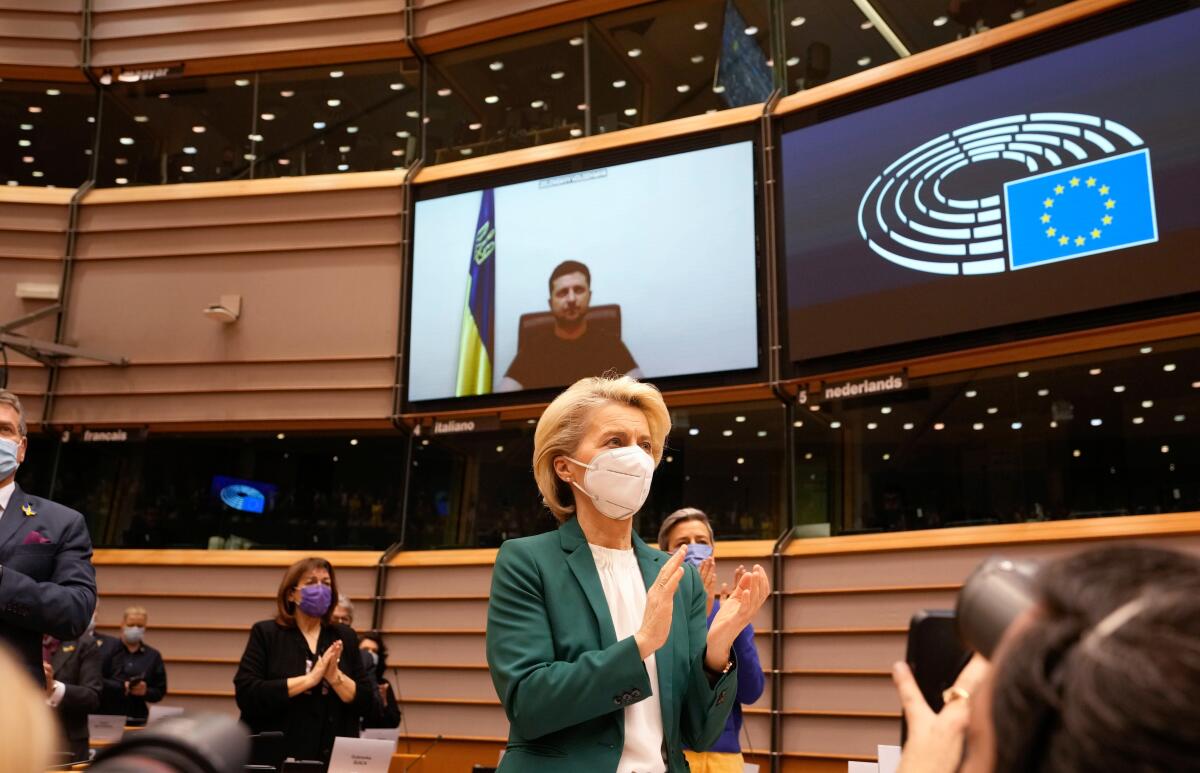Waging war, wielding words: Zelensky’s speeches have made him a folk hero

The wartime optics were impeccable. Clad in olive drab, seemingly paler than the day before, unruly facial stubble thickening into a goatee, and with his country’s familiar cerulean-and-yellow banner by his side, Ukrainian President Volodymyr Zelensky launched into his latest appeal for help in the lopsided war against Russia.
This time, his audience was the U.S. Congress, and Zelensky’s speech by video link featured what has become a trademark blend of passion and defiance — a rhetorical flair that has propelled the Ukrainian leader to folk-hero status not only among his own people, but in the halls of Western legislative power.
Since the war’s outbreak, the 44-year-old leader has made similarly electrifying appeals to the European Parliament, Britain’s House of Commons and Canada’s national legislature, marshaling down-to-earth yet soaring oratory to galvanize and heighten international support for his battered homeland. But this was the highest-profile turn yet in his virtual tour.
Much is made of Zelensky’s former career as a comedian and an actor — playing a president on TV, no less — but these wartime weeks have showcased a leader who appears remarkably skilled, even from a distance of thousands of miles, at reading the room. He has an everyman’s earnestness and a charisma that pops, beleaguered but not bowed.

Historical references are carefully tailored to resonate with particular audiences: for the Americans, evocations of Pearl Harbor, Sept. 11, and civil rights icon Martin Luther King Jr. For Britons, an allusion to Shakespeare and Churchillian cadences. For Europeans, an assertion that Ukraine is part of the Continent’s family of nations. For Canadians, a reminder of that country’s 1.4-million-strong Ukrainian diaspora.
Such code-switching is akin to the linguistic nimbleness Zelensky displays in nightly videos he has recorded in Kyiv almost since the start of the war — delivered mainly in Ukrainian, but switching to Russian to appeal directly to invading troops or the citizens under Russian President Vladimir Putin’s rule. Or perhaps even to Putin himself, who in contrast, comes off as a dour, scolding uncle from another age.
In his 17-minute congressional address on Wednesday, almost all of it delivered via an interpreter, he turned to English for a final personal appeal to President Biden: “Being the leader of the world means to be the leader of peace.”
It is an entreaty as much as it is a challenge to nations that have so far lauded him with standing ovations, but sent him no troops, planes or battleships. With each speech, Zelensky seeks to paint Ukraine’s peril in vivid, close-to-home strokes:
Imagine, he urged Canadian lawmakers, that it was Toronto’s landmark television tower, not Kyiv’s, under bombardment. Any public plaza could have been Freedom Square, he told European lawmakers after the city-center expanse by that name in Kharkiv, Ukraine’s second-largest city, was devastated by shelling.
And aimed squarely at all of his international audiences, the bleak suggestion: These bloodied children could be yours.
“We have a desire to see our children alive,” he told the European Parliament. “I think it’s a fair one.”

Although each address has been different, certain themes permeate all. Zelensky stresses that Ukrainians are willing to fight for themselves, lauding the courage of outgunned compatriots. The struggle is always placed in the context of being bigger than one country, portrayed as a fight for universal democratic values.
Whether pleading for fresh shipments of weaponry, or calling, more quixotically, for a no-fly zone over Ukraine, Zelensky frames his appeal as that of an against-all-odds struggle. As for the prospect of surrender: “Haven’t even thought about it for a second,” he told Congress.
In this round of virtual appearances, such rhetoric has played well. “In Canada, we like to root for the underdog,” Prime Minister Justin Trudeau remarked just before the Ukrainian leader’s address to the House of Commons on Tuesday.
The Ukrainian’s wartime speeches are notable for their displays of raw emotion, but at the same time, he is capable of evoking piteous scenes without asking for pity. During his European Parliament address, Zelensky wasn’t the one who choked up when talking about Russian bombardment of a dense civilian area. His intepreter was.
As he has before, Zelensky alluded Wednesday, in almost casual fashion, to his own mortality. One very real measure of freedom, he told Congress, is “to die when your time comes, and not when it’s wanted by someone else, by your neighbor.”
As a video clip to accompany an elegy, the utterance would almost be too perfect.
To be sure, the Ukrainian leader sometimes stumbles. His repeated appeals for a no-fly zone have so far fallen flat, with both NATO and Washington reluctant to engage in aerial combat that would constitute direct warfare between the alliance and Russia. Despite near-constant expressions of gratitude for Western aid, his public statements can occasionally veer into stridency, annoying the Biden administration on more than one occasion.
Even so, the speech offered yet another reminder that a phrase few Westerners were familiar with before Feb. 24 — the day the war began — had become part of the allied lingua franca.
“Slava Ukraini,” Zelensky told lawmakers, to sustained applause: glory to Ukraine.
More to Read
Sign up for Essential California
The most important California stories and recommendations in your inbox every morning.
You may occasionally receive promotional content from the Los Angeles Times.










